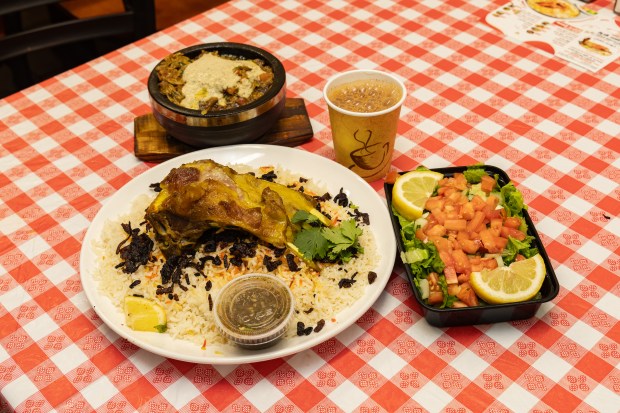This year has brought a variety of new restaurants, bars and bakeries to Chicago, from Filipino-owned Umaga Bakehouse to Evan Funke’s Tre Dita. It can be hard to keep up with all the openings.
So as we pass the halfway point of 2024, the Tribune food team offers looks at three notable places that have opened in recent months.
These reviews are unstarred, as we only visited each place once, instead of the usual two visits for full reviews.
— Kayla Samoy, food editor
Know of a Chicago-area restaurant or bar that’s new and notable? Email food editor Kayla Samoy at ksamoy@chicagotribune.com.
Al-Diar
Al-Diar, a welcome addition to the Arab food landscape of Chicago, is a small family-owned Yemeni restaurant with only a few table settings. Since opening in River North in November, the owners and managers have reportedly told many customers that they have the “best lamb in Chicago.”
Business partners Mohammed Mohammed and Zack Saeed said their lamb is from a relative’s farm in Rockford. The quality is certainly apparent in the half mandi lamb ($17), which consisted of two glistening yellow bone-in pieces served atop a bed of fluffy well-separated multicolor rice. Tender and flavorful to the bone, they were worth digging into with my hands; the provided plastic silverware could not match the task. The meal was eaten with the traditional spicy, green sahawig (also known as zhoug), but there was also a new-to-me variation with yogurt — a bit like a homemade concoction of chutney and raita. Crisp onion and cilantro added additional freshness to the plate.
I came to Al-Diar for the lamb, but also because I’m always chasing the thrill of my favorite restaurant in the whole United States — Sheeba in Detroit. At Sheeba and other restaurants like it, I developed a simple set of expectations: spiced chai, tender lamb with rice, fahsa with fresh baked bread, soup (also known as maraq) and zahawig.
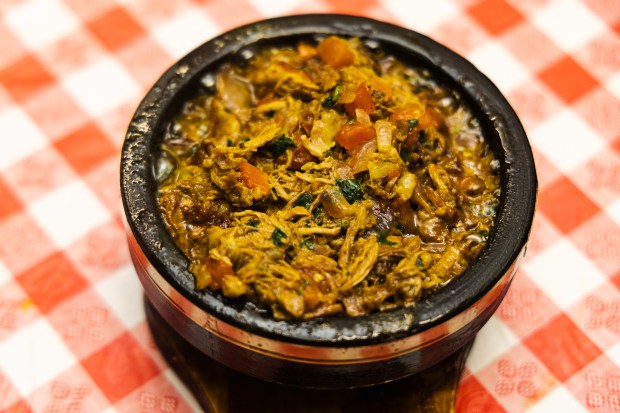
At Al-Diar, I ordered my go-to dishes; they were very much worth returning for. I mistakenly thought I was ordering a half mandi and haneeth — I actually had to choose between the two preparations, which the owners say are similar but vary in seasoning. The Adeni chai ($1.99) was closer to a karak chai in the South Asian style — quite dark and milky.
The maraq, a soup that is unlisted on the menu and typically begins the meal, took a moment to prepare, but was well worth the wait, sipped out of a cup with vegetables floating in the clear yellow lamb broth.
An Arabic salad ($5.99) of lettuce, cucumbers and tomatoes was surprisingly fresh and farm-simple, with only lemon as a dressing.
There was one area I had conflicted feelings about: the fahsa ($25). It’s usually my favorite dish, a searing hot pot of bubbling lamb, spices and vegetables best enjoyed with tannour bread a bit like naan. Al-Diar’s version was chunkier than I prefer and did not have house-made bread. Still, it was obscenely flavorful and would be incredible on that rice. My plastic spoon would have melted and drooped in that level of heat. Perhaps next time I would ask for metal silverware.
Also of note are the breakfast offerings, which I did not sample. Muhammad told me they typically cook the lamb every morning for over three hours. The main menu is available around noon, but there are options such as fava beans and eggs before then.
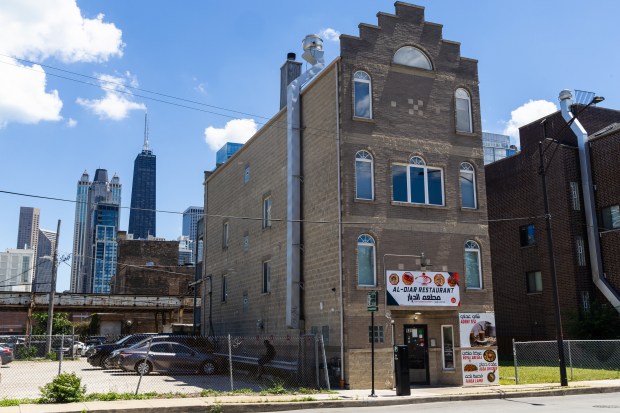
Less than a mile down Orleans from Mr. Beef, Al-Diar could very well adopt the name Mr. Lamb. Next time, I’ll try the chicken, but I doubt it’ll be as tender.
Saeed said they have plans to open a second location in Bridgeview shortly. — Ahmed Ali Akbar
939 N. Orleans St., 872-299-3019
Bayan Ko Diner
Bayan Ko Diner opened in May in Ravenswood for breakfast and lunch, just down the street from chef Lawrence Letrero and general manager Raquel Quadreny’s original restaurant, Bayan Ko. That restaurant has transitioned to offering a tasting menu, but the diner caters to more casual eating. It combines the couple’s heritages (Letrero is Filipino and Quadreny is Cuban) and draws on flavors that are nostalgic to them.
“The biggest thing was just deciding what to do with the concept,” Letrero said. “The building was a diner before us, so it kind of made sense to keep it that format, but do it the way we do things.”
Bayan Ko Diner offers the classic Filipino silogs, a breakfast plate comprised of your choice of meat, garlic rice, fried egg and tomato salad.
“I’m a classic guy and I just love a silog,” Letrero said, noting that their house-made tocino is his favorite. “Give me some fried rice, with a runny egg and some sweet carmelized meat and I’m pretty happy with that.”
Quadreny’s favorite dish is their vegetarian Spanish tortilla, a big Spanish omelet that’s filled with confited potatoes. “It’s traditional and it’s delicious,” she said.
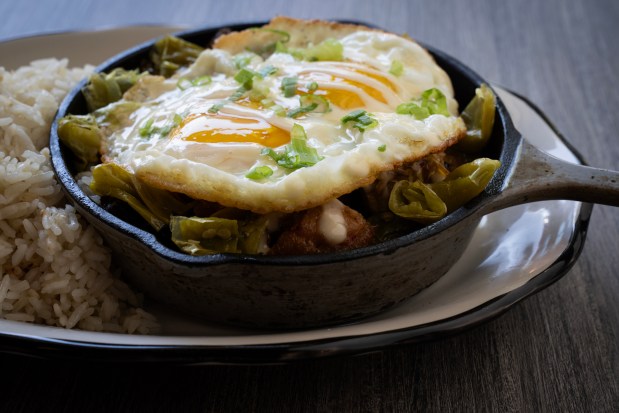
But the diner’s most popular dish is another Filipino classic, the sisig. Their version is a sisig shishito hash ($18), featuring chewy chopped pork belly that wasn’t too fatty, tender and crispy breakfast potatoes, a creamy sunny side egg and a soy black vinegar aioli that added just the right hint of acidity to the whole dish. Sometimes sisig can be too rich and greasy, but this one was nicely balanced and came with a fragrant garlic fried rice to add even more flavor.

The pork belly is cooked like a lechon kawali (a Filipino crispy deep-fried pork belly dish) boiled until it’s soft and then fried twice, Letrero said.
“People love hash, people love pork belly. I knew it would be popular,” the chef added, noting that it often outsells their coffee, which they get from Big Shoulders. I had the cafe con leche ($5.50), a smooth espresso with steamed and condensed milk.
I also tried The Pinoy breakfast burrito ($15) filled with longanisa sausage, scrambled eggs, breakfast potatoes, cheddar, and tomato and onion salsa. The bright tomatoes offer a freshness to balance out the strong meatiness of the slightly-sweet longganisa, and the salsa roja sauce added a nice kick of acidity and a little bit of Thai chili heat.
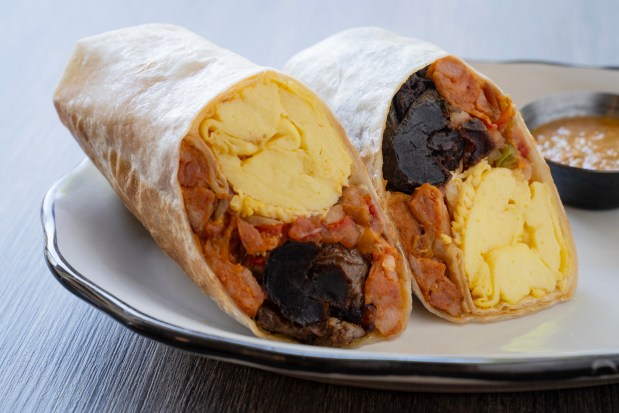
I had my eye on the sticky ensaymada, a pull-apart monkey bread with cinnamon glaze, but the last one had sold just minutes before I ordered, so I pivoted to the ube pancakes ($16) instead for something sweet.
The stack that came out was beautifully Instagram-worthy, the fluffy purple pancakes surrounded by a swirl of purple condensed milk syrup and topped with whipped cream, fruits and flakes of coconut. The whole thing was tasty and not too sweet, but with only a subtle hint of ube flavor.
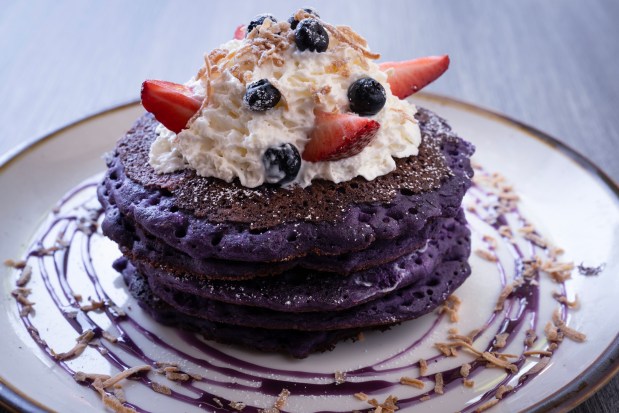
The owners said they’re looking to start offering dinner at the diner likely in the beginning of August.
“We’re looking to add some of the original, greatest hits from when we first opened Bayan Ko,” Letrero said.
Some of the lunch menu will cross over as well, including the lumpia. Plus the couple plans to add a cold seafood oyster program and an alcoholic drinks menu.
— KS
1820 W. Montrose Ave., 773-915-3117, bayankodiner.com
Casa Madai
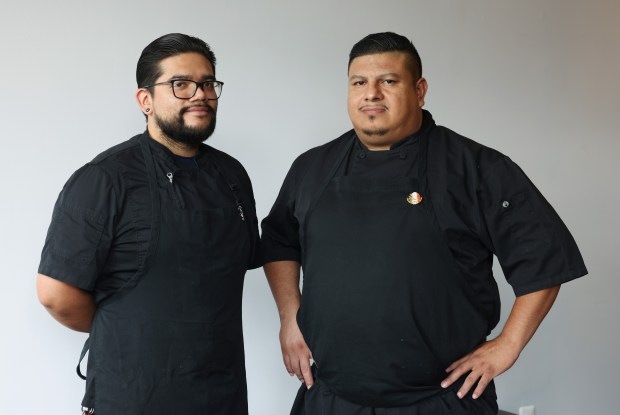
This spring’s opening of Casa Madai in the Pilsen neighborhood brought what is perhaps Chicago’s first Japanese omakase restaurant owned by a Mexican American chef to the Lower West Side, where he is connecting foodways oceans away from one another in each dish.
Chef Ismael Lucero Lopez opened his sushi restaurant in March in what was once Step Down Cafe, reaching a full circle moment in his 25-year culinary career as a former protege of chef Junzan Ichikawa. Savvy sushi fans may know of Lucero Lopez’s work in Madai in Time Out Market in the West Loop, which opened late last year, or from his previous stints at Japonais, Tengoku and Rebar.
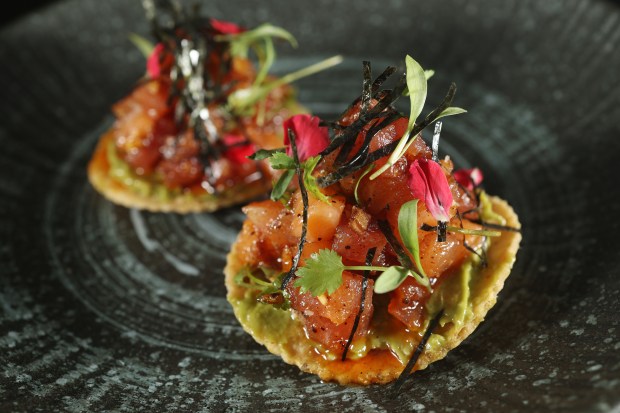
At Casa Madai, start with the sake maguro tostadas ($14), one of the chef’s favorite dishes, with diced tuna, salmon and avocado, sudachi, doused in salsa macha and sprinkled with cilantro, all atop a small-sized tostada. Each lemon zest-topped bite is a bundle of savory and umami flavors, where the sauces with different heritages are used in a way that doesn’t overpower one another.
“In Mexico, we normally don’t use the lemon zest or any zest at all. In Japan they do,” the chef said.
Lucero Lopez offers two entry points to an omakase dinner at Casa Madai: a $65 table omakase, which comes with six dressed nigiri, or a full 13-course omakase dinner for $150 per person. I savored each bite in the six-piece option, where the range of textures was subtle but powerful.
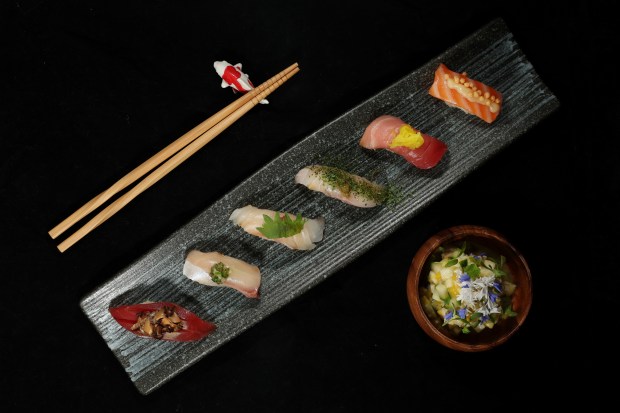
Begin with a roasted almond-topped akami sauteed in shiitake butter. “When you eat that piece it almost takes you back like you’re eating steak,” the chef said.
The chutoro, dressed with a delicate zest, was fatty and full of flavor. Striped jack is paired with salty-sweet cooked Japanese plum sauce. Creamy soy marinated zuke sake salmon is seared and shocked in ice water and topped with crunchy rice puffs.
Madai — the restaurant’s namesake — also gets plum and soy sauce and on top, a piece of umeboshi and finished with Japanese mint leaf. Amberjack is compounded by pure sesame oil and nori. “It has this earthy, spicy taste,” he said.
The accompanying house soy sauce is even more complex.
“My house soy is infused with kombu, dashi, shaved tuna flakes, a little bit of sake and mirin, and I infuse it for 48 hours at least, otherwise it doesn’t taste the same,” Lucero Lopez said. “To finish, I put chives in ginger that have been sauteed with olive oil.”
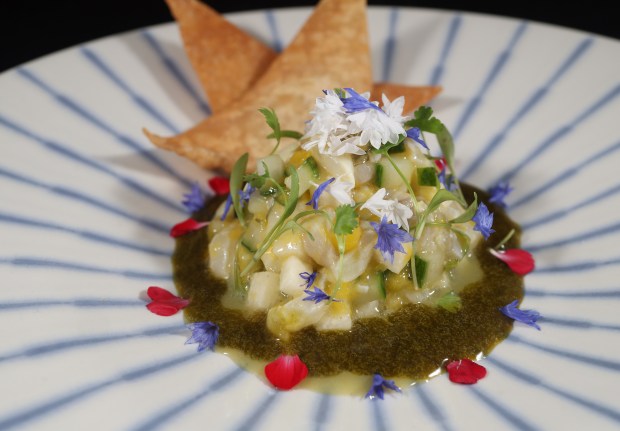
A ceviche dish served with the table omakase was perfectly briny and acidic with mango, cucumber and jicama in ponzu citrus sauce, though the chip didn’t support the supple whitefish topped with micro-cilantro as well as I would’ve liked.
Do note that the restaurant plans to serve a red miso soup with the table omakase in the colder part of the year. On my weeknight visit in June, there was some confusion over the appetizer that’s included with the omakase. I received the ceviche first and the miso soup when I asked for it, and I wasn’t charged for the additional dish.
The La Baja roll ($20), with Panko-breaded shrimp, akami and topped with marinated jalapeño balanced crunchy texture with creamy avocado and a touch of heat.
The vibrant mochi con alegria ($10) transfixed me visually, and was an oasis of cooling coconut flavor on a steaming hot day. Your choice of vanilla or chocolate ice cream is topped with chewy mochi, coconut flakes, flecks of alegria, a Mexican puffed amaranth candy, spices and edible flowers.
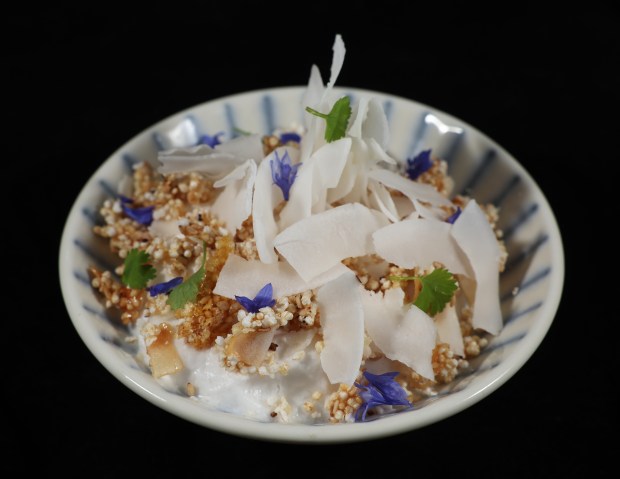
Casa Madai is BYOB as well, but Lucero Lopez says a liquor license is underway. Our hostess happily refilled our glasses of wine and chilled the bottle as we dined.
You can tell the chef is having lots of fun with the menu, wanting to intertwine the culinary messages of his heritage with his adopted palette and skill set. You may be surprised to know the chef has never visited Japan.
Hues of deep blues adorn the walls and tableware, reminding me of the wide open Pacific, while cozy lamplight and exposed brick in the space took me right back to Pilsen’s warm familiarity. And the choice to not be on 18th Street, where the vast majority of restaurants in the neighborhood are, was indeed intentional.
“I wanted my restaurant to be a destination for people. If they want to have good sushi or good service, I want them to come to me,” Lucero Lopez said. — Lauryn Azu
2023 S. Racine Ave., 872-342-2105, casamadai.com
Big screen or home stream, takeout or dine-in, Tribune writers are here to steer you toward your next great experience. Sign up for your free weekly Eat. Watch. Do. newsletter here.


